The Duomo isn’t just Florence’s crown jewel—it’s the city’s unofficial cardio test and patience marathon. One wrong move and you’re baking in a two-hour queue and missing the Baptistery. This is your crash course on how to visit the Florence Duomo, with tips on what to see, how to climb the dome, tickets, hours, and plenty more.
Your quick answer: Reserve a Brunelleschi Pass or guided tour online, enter at the north Cupola door (not the main nave), and bring quality shoes for the Dome climb.
Visiting the Florence Duomo
Brunelleschi’s dome crowned Florence in 1434, beating gravity with the world’s first double-shell masonry vault. For six centuries it has towered above political coups, Medici coronations, and selfie sticks alike. Conquer its 463 steps and you’re treading the same stones that launched the Renaissance.
Tickets & Hours
So, how much does it cost to see St. Peter’s Basilica? Here are the hours and prices.
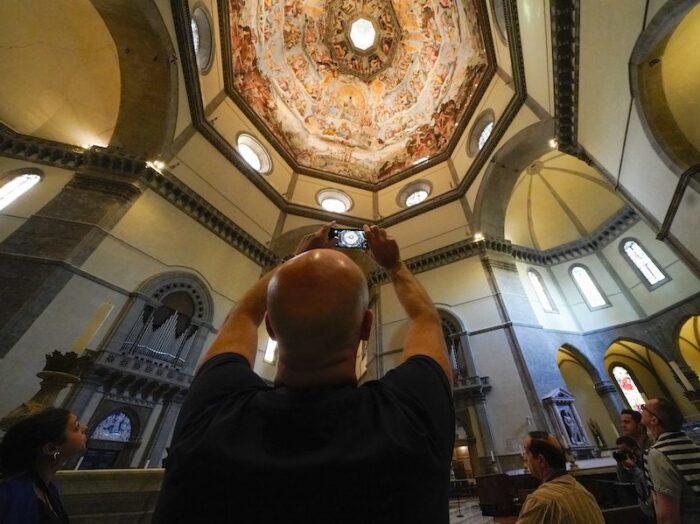
- Brunelleschi Pass (all sites): €30 adult | €12 reduced (children, students, etc.)
- Giotto Pass (everything except the Dome): €20 adult | €7 reduced
- Ghiberti Pass (museum, baptistery, crypt): €15 adult | €5 reduced
Key 2025 Hours
| Site | Open |
| Cathedral | Mon–Sat 10:15 AM – 3:45 PM |
| Dome | Mon – Fri 8:15 AM–6:45 PM; Sat 8:15 AM – 4:30 PM; Sun 12:45 PM – 4:30 PM |
| Baptistery | Daily 8:30 AM – 7:30 PM |
| Bell Tower | Daily 8:15 AM – 6:45 PM |
| Museum | Daily 8:30 AM – 7:00 PM |
👉 No tickets left on the official Florence Duomo website? We reserve a limited number of Florence Duomo tickets ahead of time just for this reason.
How to Get to the Florence Duomo
You’ll find the Florence Duomo in Piazza del Duomo, right in the historic center. It’s impossible to miss once you’re nearby.
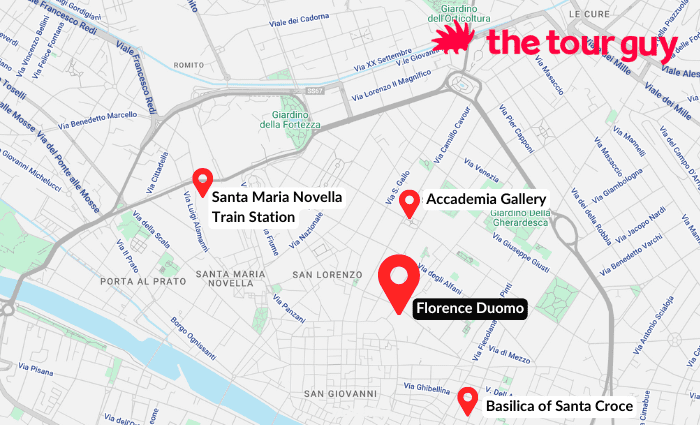
- On Foot: 10 min from Santa Maria Novella station, 8 min from the Accademia or Uffizi, 25 min from Piazzale Michelangelo.
- Bus: Lines C2, 6, 11, 14 stop within two blocks of Piazza del Duomo.
- Taxi: From most centro-storico hotels it’s under €10—tell the driver “Piazza del Duomo, lato biglietteria.”
Interessante Fact: Medieval planners designed the alleys to open suddenly onto the Duomo—an urban “ta-da!” six centuries before Instagram.
Best Guided Tours
For your schedule, interests, and budget.
👉 Not ready to book? See our rundown of the Best Florence Duomo Tours to Take and Why.
Visitor Tips for Florence Duomo
To make the most of your visit, follow these tips.
- Lock in your slot in advance: Dome tickets and group tours can sell out days in advance.
- Wear sturdy shoes: Those 463 medieval steps can be slick.
- Cover your shoulders and knees: Otherwise, you’ll be refused entry.
- Pack just a small bottle of water: Large bags are refused.
- Claustrophobic or have heart troubles? Choose the terrace-only ticket instead of the full dome climb.
How Long Does a Florence Duomo Visit Take?
A guided tour of the Florence Duomo with dome climb typically takes about 1.5 to 2 hours. On your own, you’ll need at least an hour just for the cathedral and dome climb, not counting time spent queuing. Add another 45–60 minutes to visit the Baptistery and Opera del Duomo Museum afterward.
What’s Worth Seeing Inside the Florence Duomo
👀 Click on the name of the stop for a detailed explanation.

- Cathedral Interior: Severe Gothic nave, Vasari’s Last Judgment fresco, and the exact spot where Giuliano de’ Medici fell in 1478.
- The Dome: Brunelleschi’s double-shell marvel finished in 1434; still Europe’s largest masonry dome.
- The Baptistery & Gates of Paradise: Lorenzo Ghiberti spent 27 years on those gilded bronze doors Michelangelo called “worthy of Paradise.”
- The Opera del Duomo Museum: 750 artworks, from Donatello’s Penitent Magdalene to the original Baptistery doors and Michelangelo’s cracked Pietà.
Interessante Fact: Florentines once believed the dome would collapse under its own weight. Six centuries later, engineers still study how Brunelleschi pulled it off.
👉 Want every scandalous back-story? The Complete Florence Duomo Tour covers dome secrets, Medici murder, and museum masterpieces.
How to Climb the Florence Duomo Dome
Want to enjoy that 91-meter view? Follow this checklist:
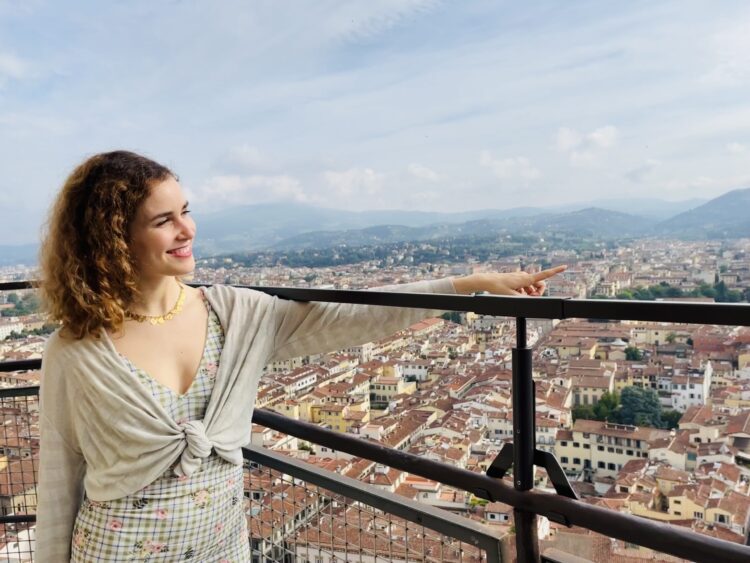
- Lock in your slot: Buy the Brunelleschi Pass online or book a tour.
- Show up 20 min early: Enter at the north door marked Cupola—not the main cathedral doors.
- Pack light: Grippy shoes, 500 ml water bottle max, phone. Large bags get denied.
- Climb in stages:
- 150 broad spiral steps—find your rhythm.
- Interior gallery—pause for Vasari’s fresco.
- Final tight corkscrew—single-file, steady breathing.
- 150 broad spiral steps—find your rhythm.
- Top Must-do: Walk the full circle clockwise for views of the Tuscan hills and Ponte Vecchio.
- Down & reward: Take the same stairs out, then treat yourself to gelato at Edoardo.
Interessante Fact: Brunelleschi convinced skeptics by balancing a cracked egg upright on a table—proof that lateral thinking beats blueprints.
👉 Skip the queue and add exclusive terraces on the Duomo Dome Climb with Secret Terraces.
Secret Tip
Want bragging rights? Be among the first through the Duomo doors as the lights turn on.
On our Early Morning Duomo Tour with Exclusive Entry and Brunelleschi’s Dome, you’ll watch the key master unlock the doors, sip an Italian cappuccino, and climb the cupola before anyone else is out of bed. By the time other tourists queue, you’ll already be posting skyline shots.
Top Florence Hotels
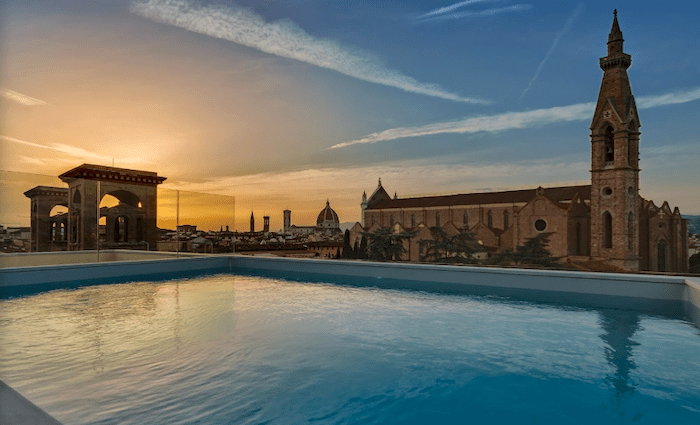
Plaza Hotel Lucchesi ⭐⭐⭐⭐
Rooftop Pool · Family Friendly · Santa Croce
Simple hotel with classic charms and an epic pool perfect for hot summer days.
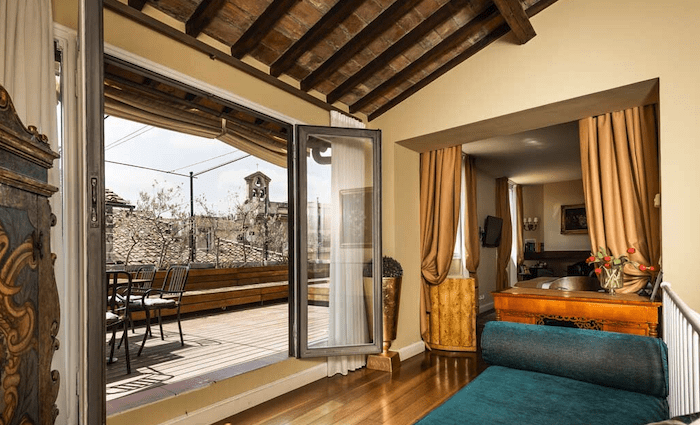
Aqa Palace ⭐⭐⭐⭐
Santa Croce · Rooms & Apartments
Great value hotel that’s neatly decorated. Perfect for those looking for extra space.
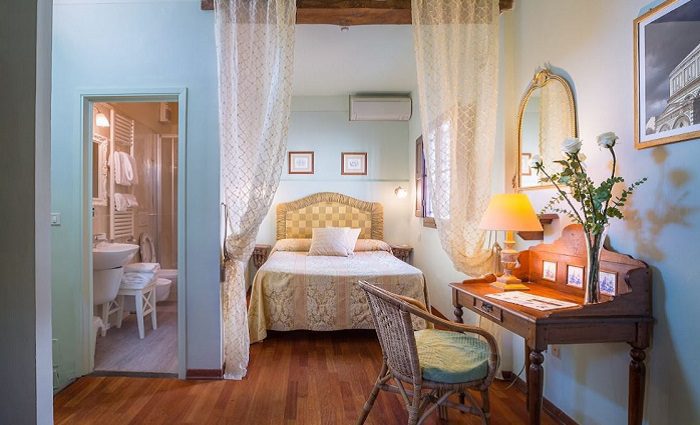
Hotel Torre Guelfa ⭐⭐⭐⭐
Unique Rooms · Terrace · Pet Friendly
Set in a restored medieval tower, this upscale stay combines antique elegance with comfort.
Where to Eat Near the Duomo
Here’s where locals go:
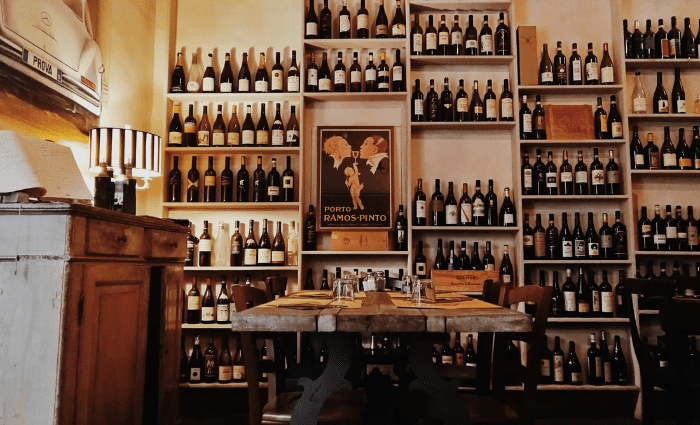
- Coquinarius (€€) – Pear-and-pecorino ravioli, stellar wine list.
- La Ménagère (€€) – Chic brunch & craft cocktails.
- Trattoria Dall’Oste Chianineria (€€) – For proper Bistecca Fiorentina.
- Trattoria Mario (€) – No-frills Tuscan, communal tables, huge meat portions.
Interessante Fact: Florentine steak is always served rare; locals joke anything more cooked is “for the English.”
👉 Find more Great Restaurants Near the Duomo.
Attractions Near the Florence Duomo
These are all within walking distance of the Duomo and make a great addition to your Florence itinerary.
- Uffizi Gallery: Just down the street, it’s home to Botticelli’s Birth of Venus and Renaissance icons galore.
- Accademia Gallery: Michelangelo’s David is a must-see—and it’s only 8 minutes away.
- Ponte Vecchio: Florence’s most iconic bridge, lined with glittering jewelry shops and golden views over the Arno.
- Palazzo Vecchio: Towering over Piazza della Signoria, this fortress-like palace holds centuries of Florentine power and intrigue.
👉 For more ideas, check out our article on the Top Things to Do in Florence.
Frequently Asked Questions About the Florence Duomo
Yes, from time to time, we offer promo codes for the Duomo on our dedicated promo codes and discounts page.
Yes, you’ll need a ticket to access most parts of the Florence Duomo complex. General cathedral entry is free, but climbing the dome, visiting the Baptistery, the museum, or bell tower requires a timed-entry ticket or tour reservation.
Climbing the Florence Duomo dome takes about 30 to 45 minutes, depending on your pace.
To climb the Florence Duomo, use the north side entrance marked Cupola. This is separate from the main cathedral entrance and is only accessible with the correct ticket or guided tour.
Yes, to visit the Florence Duomo and Baptistery, your shoulders and knees must be covered. This dress code is strictly enforced, so plan accordingly.
The 463-step dome climb involves steep, narrow passages with no elevators. It’s not recommended for visitors who are pregnant, claustrophobic, have heart conditions, or limited mobility.
Final Thoughts
Brunelleschi’s dome isn’t just skyline candy—it’s Florence’s beating, brick-laid heart. Whether you grab a timed ticket, sprint up 463 steps, or let a storyteller unlock the secret terraces, just don’t skip it.
Need the rest of your trip dialed in?
Best Florence Tours to Take & Why
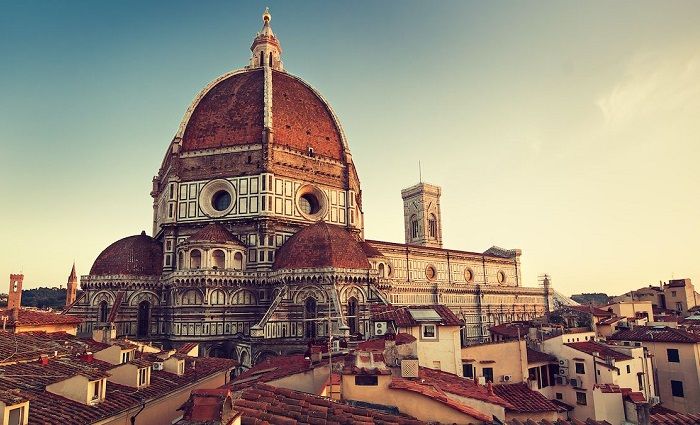
Where To Stay in Florence
Florence has a small historical center packed with iconic landmarks to explore. Plan where to stay in the best neighborhoods in this beautiful city.
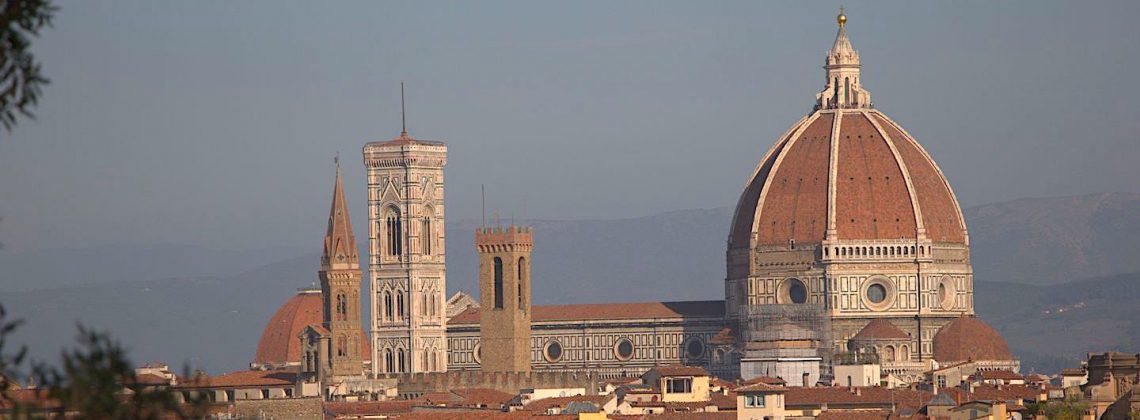
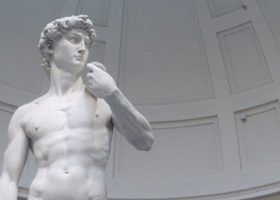
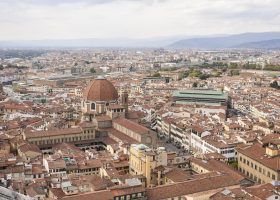
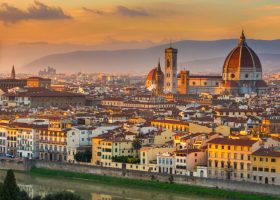
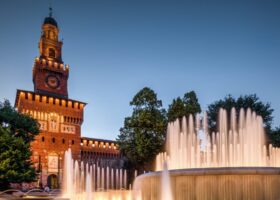
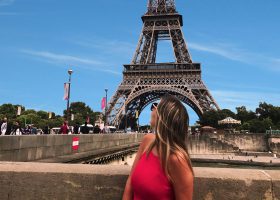
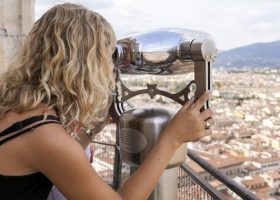
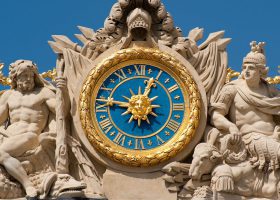




Thank you for explaining this. We’re I. Europe right now and struggling with websites not being clear or having information on where to purchase tickets. Thanks!